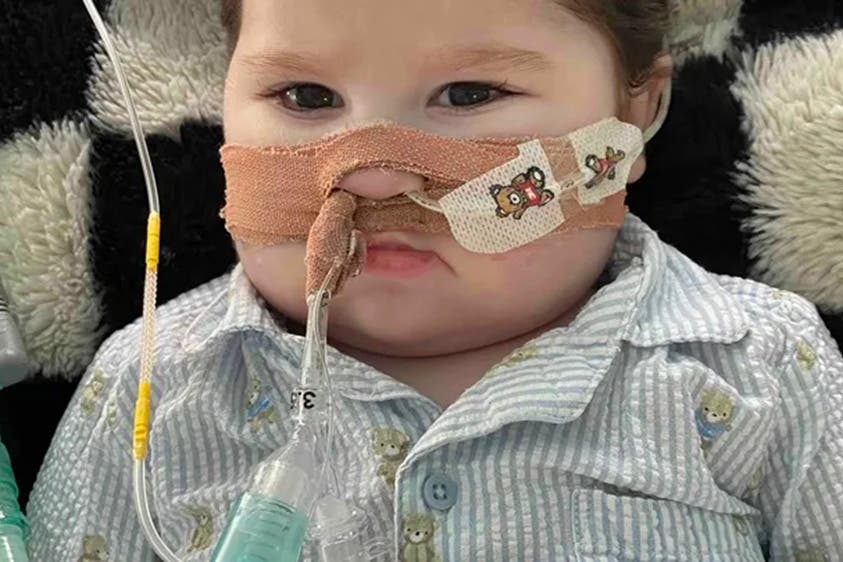Mother in High Court battle with hospital over one-year-old son’s life support
Ayden Braqi has a ‘severe, progressive and irreversible’ medical condition for which there is no cure, the High Court was told.

A mother of a one-year-old boy has told the High Court that her son should be allowed to come home from hospital amid a legal battle over whether his life-sustaining treatment should stop.
Ayden Braqi suffers from a “severe, progressive and irreversible neuromuscular disease” for which there is no known cure, but is “cognitively intact” and can “see, hear, smell, feel, and enjoy”, the High Court was told.
The Great Ormond Street Hospital for Children NHS Foundation Trust, which cares for him, has asked a judge to rule that his life-sustaining treatment should stop, with its lawyers claiming that the burdens of treatment “outweigh the limited benefits he could enjoy” from prolonging his life.
Ayden’s mother, Neriman Braqi, opposes the bid, claiming that he could return to their home to continue to receive care and that he “still smiles” despite his condition.
There, he is alive, but coming off there is living
Giving evidence in a hearing which concluded on Monday, she said: “I do say that this (returning home) is an option for him.”
She continued: “There, he is alive, but coming off there is living.”
She added: “I want him to go home, and this is what I always wanted for him.”
Ayden was admitted to Great Ormond Street Hospital at around three months old and has remained there ever since.
Ms Braqi said in her evidence that she could spend around 16 hours a day with Ayden.
She praised Ayden’s care but said different treatment that would allow him to return home “could have been done (and) can be done”.
Debra Powell KC, representing the trust, said in written submissions that Ayden has a “very rare type of genetic disorder that causes profound and progressive muscle weakness”, leaving him “unable to breathe for himself and has no spontaneous movement of his limbs”.
It is in his best interests to receive palliative care only
He is on a ventilator and his prognosis is “very poor”, with Ms Powell adding that treatment of his progressive condition is “futile”.
She said: “Ayden’s life will inevitably be significantly shortened by his condition, and the severity of his condition is such that it is difficult or impossible for him to derive significant benefit from continued life. It is in his best interests to receive palliative care only.”
She added that medics believe treatment which could allow Ayden to be cared for at home is not possible, due to Ayden’s “clinical instability”.
Cleo Perry KC, for Ms Braqi, said in written submissions: “He has cuddle time with his mother for several hours each day.
“In the main, he is assessed, within the medical records, as comfortable, ‘content relaxed’, with ‘no distress or anxiety observed’ and not in pain.”
She added: “When he is in discomfort the mother can tell and take steps to make him comfortable.
“His life may be seriously limited but he can remain comfortable in the heart of his family.”
Ms Perry continued that Ms Braqi “accepts the diagnosis” but “wishes for the continuation of all available care for Ayden”.
Malcolm Chisholm, representing Ayden’s guardian, said in written submissions that continued treatment meant there was “a likelihood that Ayden will die in an emergency situation”.
He added that the guardian, “with great sadness and regret”, supported the trust’s position as it was in Ayden’s “best interests”.
Mrs Justice Morgan will give her decision in writing at a later date.
Following the hearing, a spokesperson for Great Ormond Street Hospital for Children said: “At Great Ormond Street Hospital we look after children with some of the most complex and serious medical conditions.
“For every child, our staff always have their very best interests at the heart of all decision-making.
“We do our best to build trust with patients and their families so that we can have open discussions with them and support them through difficult times, including when it is necessary to discuss whether continuing invasive, life-sustaining treatment is in their child’s best interests.
“Going to court is our very last resort and something we only do when all other avenues are exhausted.
“We acknowledge that this is a situation no parent or clinician wants, and we fully respect the position of Ayden’s family, and our thoughts are with them.
“As we await the judgment it would be inappropriate to comment further at this stage.”
